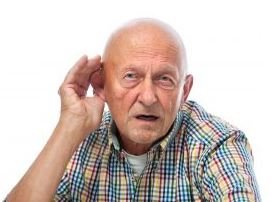Perhaps as a cry for help, DW bought me one of those $20 "hearing aids" that was advertised on TV. It promised incredible things and delivered, well, you know. Cwap!
To further muddy the waters, there are things called "personal sound amplification products" that are designed to boost certain sounds for people without hearing loss, like for hunting or birdwatching. They aren't regulated by the FDA, and I wonder if some of the low-cost devices I see advertised are actually PSAPs, and people obviously don't know the difference.
So how often do you need to have your HAs "fixed?" Do they go bad or break or do changes in hearing require frequent adjustments? Not looking forward to making more appointments to deal with HAs. No ability or interest to fix them myself. YMMV
I don't know what you mean by "more" appointments, but one of the frustrations with hearing aids is getting them programmed so they work for you. This is where the comparison between prescription glasses and hearing aids falls apart. When you get new (or your first) glasses, you can instantly see clearly. And you don't go, "Oh my god, everything is too clear--I'm being driven crazy," while when people first get hearing aids, they're driven insane by how loud everything is (paper rustling is AWFUL), until their brain adjusts.
Hearing aids get an initial program set based on your audiogram, but there are many many tweaks that can and should be made, like to lower feedback, or to boost voices in a noisy environment, or to reduce howling from wind. It's not just a matter of "this object at 15 feet is now clear."
It can take several or even many trips to the audiologist to get them to work right for you. I have severe-to-profound loss in one ear, so I absolutely need them, and even so, the visits to the audiologist when I get new hearing aids wear me down and make me inclined to just say, "They're fine," when they're really not. For people with mild hearing loss who can function
okay without them, that's how they end up in a drawer.
Plus, like for reducing wind noise--you can't duplicate that in an office, so the audiologist will try a setting, and then you go out in the real world ad see if it worked, and if it didn't, you have to go back. It takes a lot of fortitude, and that's one reason I embraced making adjustments on my own.
As for getting them fixed, the pair I have now is a saga, and includes one of them suddenly going to very low amplification in the late afternoon, but not every day. Sometimes both of them would do it. They were sent in for repair, and the loaner DID THE SAME THING. What the hell?
The audiologist and the Resound rep both said they'd never heard of such a thing, and of course I could never duplicate it because it would fix itself by the next morning. They eventually gave me new ones, and the replacements have even done it a couple of times (although my data set is compromised because I almost entirely stopped wearing them during Covid because I stayed home all the time and just use captions for the TV).
I've also had previous ones stop working, which required having them sent in for repair. They're electronic devices, and we all know how electronic devices act.
One thing that's a bright spot for people with mild to moderate loss is the advent of open fit hearing aids, the ones that sit behind your ear (BTE) and a wire goes to a rubbery dome down in your ear. The domes come in different sizes so there are still fit issues, but it's a hell of a lot easier to get a dome to fit right than an ear mold.
Between not having to fit an ear mold and being able to tweak settings yourself, these cheaper OTC aids really might work well for some people. But if people don't realize it's not like getting glasses for the first time and suddenly you can see the leaves on the trees, they're going to be very disappointed, and convinced the damn things don't work.
And I don't really understand how this is going to significantly bring down the price of non-OTC hearing aids, because that price includes unlimited visits for adjustments, so comparing that price to the cost of OTC aids doesn't really work. Audiologists could lower the price for hearing aids tomorrow
if they started charging for their time every time someone comes in for an adjustment. But that would create a significant disincentive for people to make the appointments needed to get their hearing aids working as well as they could, making them even more likely to end up in a drawer.
The microphones would pick up the sound of the wires scraping on my eyeless ear pieces.
I have reading glasses I put on and take off frequently, and when the temples hit my BTE hearing aids, it makes a horrendous noise. Nobody has ever been able to make an adjustment that prevents it. I've gotten to where I don't put my glasses on my ears, but instead put them an inch or two above them, which of course makes them more likely to fall off if I lean my head over. But that sound...it's unbearable.

